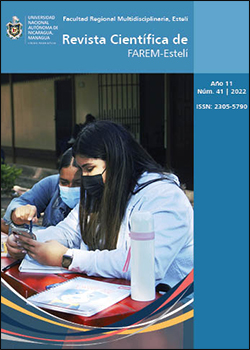A Participatory Action Research (PAR) to reduce alcohol consumption in students of the Instituto Padre José Bartocci in the municipality of Muy Muy, Matagalpa. Nicaragua
DOI:
https://doi.org/10.5377/farem.v11i41.13884Keywords:
Addictions, alcoholism in students, Participatory Action ResearchAbstract
For the World Health Organization (WHO), alcohol addiction is linked to the dependence syndrome, understood as the set of physiological, behavioral and cognitive manifestations, in which the consumption of a substance acquires the highest priority for the individual, even higher than any other behavior that in the past had a higher value. It is the often strong or insurmountable desire to ingest a psychotropic substance, alcohol or tobacco”. (Narcotics Anonymous, 51). In 2021, the Nicaraguan Ministry of Education, within the framework of educational quality in continuous improvement, identifies that 35% of eleventh grade students of the Saturday modality of the Instituto Padre José Bartocci presented various problems of: non-attendance, low academic performance, difficulties in the learning process, short-term memory learning, attitudinal problems and symptoms of alcoholism. Therefore, the research team decided to implement the methodology of Participatory Action Research (PAR), in order to diagnose the reality and influence the reduction of alcohol consumption in the students involved. The subjects of the research were: teachers, the school counselor of the Institute and the students. The instruments applied were: survey, focus group and observation guide. The implementation of the intervention plan was a relevant process to influence the problems encountered, 7 workshops were conducted with different participatory techniques. As a result of the accompaniment during this research process, the students developed skills for self-knowledge, self-confidence, self-esteem and self-control, strengthening their generic competencies and reducing alcohol consumption by 60%.
Downloads
References
Alberich, T., Arnanz, L., Basagoiti, M., Belmonte, R., & Bru, P. (2009). Metodologias Participativas Manual de Cimas. Madrid, España: Observatorio Internacional de Ciudadanía y Medio Ambiente Sostenible (CIMAS). Recuperado el 2021, de https://www.redcimas.org/wordpress/wp-content/uploads/2012/09/manual_2010.pdf
Alvarado, L., Sisio, J. M., & Garcia, M. (2008). Caracteristicas mas relevante del paradigma sociocritico. Sapiens. Revista Universitaria de Investigacion, 2, 187-202. Obtenido de https://www.redalyc.org/pdf/410/41011837011.pdf
Cruz, B. I. (Julio de 2014). Un acercamiento al proyecto de vida de jóvenes universitarios. Universidad Pedagogica Nacional, Ciudad de México, México. Recuperado el 2021, de Universidad Pedagogica Nacional Mexico.: http://200.23.113.51/pdf/30840.pdf
Hidalgo, M. R. (2014). El alcoholismo en la Adolescencia. Obtenido de https://dspace.ucuenca.edu.ec/bitstream/123456789/19993/1/TESIS.pdf
Martí, J. (2012). La Investigación Acción Participativa (IAP). Estructura y Fases. Obtenido de Universidad de Complutense de Madrid.: https://www.redcimas.org/wordpress/wp-content/uploads/2012/08/m_JMarti_IAPFASES.pdf
Méndez, A. L. (2012). Investigacion Accion. Puerto Rico. Obtenido de https://cea.uprrp.edu/wp-content/uploads/2013/05/investigacion_accion_cea.pdf
MINED. (2016). Protocolo de Consejeria de las comunidades Educativas para la promocion de valores, reconocimientos de alertas tempranas, aocmpañamiento y derivacion de situaciones que afectan la seguiridad y tranquilidad de las Familias y escuelas. Manual, Ministerio de Educación (MINED), Managua, Nicaragua. Recuperado el 2021, de https://www.mined.gob.ni/biblioteca/wp-content/uploads/2021/02/protocolo-intro.pdf
MINED. (2016). Protocolo de consejerías de las comunidades educativas para la promoción de valores, reconocimientos de alertas tempranas, acompañamiento y derivación de situaciones que afectan la seguridad y tranquilidad de las familias y escuelas. Obtenido de ttps://www.mined.gob.ni/biblioteca/wp-content/uploads/2021/02/protocolo-intro.pdf
Navarro, M. (2009). Temas para la Educacion. Revista digital para profesionales de la Enseñanza., 2. Obtenido de https://www.feandalucia.ccoo.es/docu/p5sd6409.pdf
Navarro, M. (2009). Temas para la Educacion. (F. d. Andalucia, Ed.) Revista digital para profesionales de la Enseñanza.(9), 1-9. Recuperado el 2021, de https://www.feandalucia.ccoo.es/docu/p5sd6409.pdf
Palomino, Y. (2018). Autoconfianza en jugadores de Futbol categoria C que participan en los juegos deportivos Nacionales Escolares Etapa distrital Ayaviri. Universidad Nacional del Altiplano, Facultad de Ciencias de la Educación. Peru: Escuela Profesional de Educación Fisica. Recuperado el 2021, de http://repositorio.unap.edu.pe/bitstream/handle/UNAP/9981/Palomino_Cayo_Yampiel_Javier.pdf?sequence=1&isAllowed=y
Pérez, E. M. (2007). Las Webquests como elemento de motivación para los alumnos de educacion secundaria obligatoria en la clase de lengua extranjera (IAP). Universitat de Barcelona. Barcelona, España: Universitat de Barcelona. Obtenido de https://www.tesisenred.net/bitstream/handle/10803/1292/05.EMPP_CAP_5.pdf?sequence=6&isAllowed=y
Ravines Victor, P. B. (2016). Autocontrol en adolescentes de padres convivientes y separados de Cajamarca. Lima Peru. Obtenido de http://repositorio.upagu.edu.pe/bitstream/handle/UPAGU/277/Ps.%20012%20Tesis%20Autocontrol%20en%20adolescentes.pdf?sequence=1&isAllowed=y
Ravines, V. C., & Portal, B. B. (2016). Autocontrol en adolescentes de padres convivientes y separados de Cajamarca. Universidad privada Antonio Guillermo Urrelo, Facultad de Psicología. Cajamarca, Perú: Facultad de Psicología. Recuperado el 2021, de http://repositorio.upagu.edu.pe/bitstream/handle/UPAGU/277/Ps.%20012%20Tesis%20Autocontrol%20en%20adolescentes.pdf?sequence=1&isAllowed=y
Rojas, J. R. (s.f.). Investigacion Accion Participativa. Obtenido de http://tie.inspvirtual.mx/recursos/temas/etv/OAParticipacionSocialWeb/material/La%20investigaci%C3%B3n%20acci%C3%B3n%20participativa.pdf
Valladares, G., & Vallejo, F. (2016). Prevalencia y factores asociados al consumo de alcohol en estudiantes de. Tesis de grado. Obtenido de http://riul.unanleon.edu.ni:8080/jspui/bitstream/123456789/7107/1/240102.pdf
Zapata Florencia, V. R. (Diciembre de 2016). LA INVESTIGACIÓN - ACCIÓN PARTICIPATIVA. Obtenido de Guía conceptual y metodológica del Instituto de Montaña: https://mountain.pe/recursos/attachments/article/168/Investigacion-Accion-Participativa-IAP-Zapata-y-Rondan.pdf
Published
Issue
Section
License
Copyright (c) 2022 Revista Científica de FAREM-Esteli

This work is licensed under a Creative Commons Attribution-NonCommercial-ShareAlike 4.0 International License.



